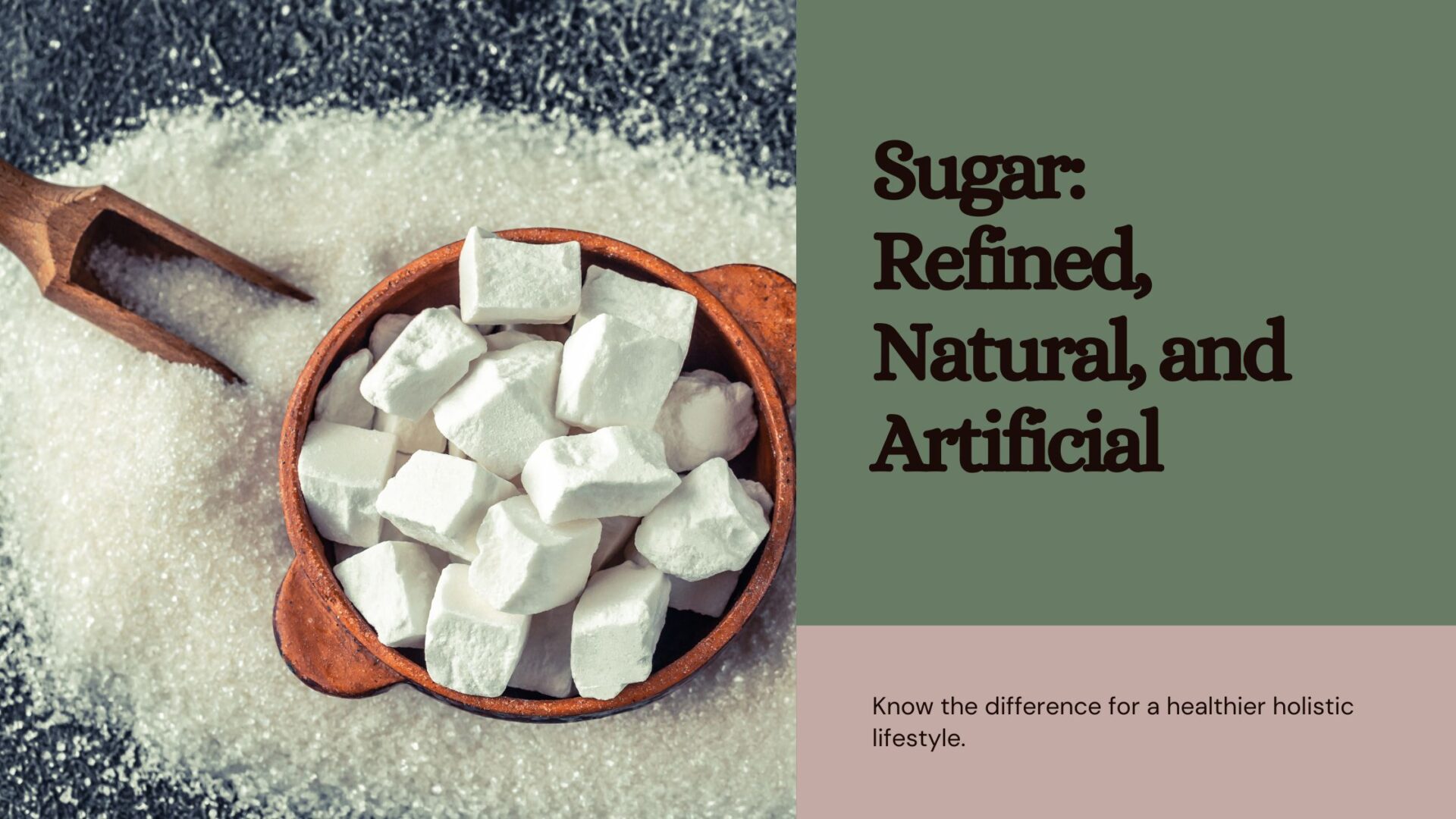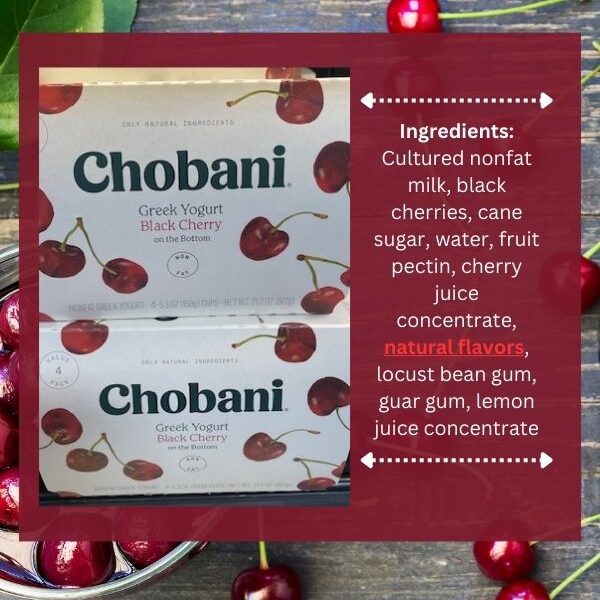
For centuries, sugar has been an addition to our diets, enhancing the taste of our favorite foods and drinks. However, it’s crucial to understand that the diverse types of sugar play a significant role. In recent years, the impact of various types of sugar on our health has garnered increasing interest and concern. This article aims to shed light on the key distinctions between natural, refined, and artificial sugars and their respective effects on our overall health and well-being.
Understanding the Basics of Sugar
Before we dive into the intricate world of sugars lurking in our food, let’s start with the fundamentals. Sugar, in all its sweet complexity, serves as the foundation for carbohydrates, which are a primary energy source for our bodies, fueling the production of ATP (Adenosine triphosphate: our bodies energy currency). When we consume carbohydrates, our body’s insulin helps transport glucose, derived from these carbs, into our cells to provide the energy we need. But there’s much more to uncover before we can make informed choices about the sugars we consume.
Carbohydrates: The Building Blocks of Sugar
Carbohydrates, the carriers of sugar, come in two primary categories simple and complex, categorized by their size and structure:
1. Simple Carbohydrates
(Monosaccharides): These are the sugars that consist of a single molecule. They include:
- Glucose: Commonly known as blood sugar, glucose is the primary energy source for our cells and serves as the end product of most sugar breakdown processes.
- Fructose: Known for its intense sweetness, fructose is found naturally in honey ,and agave, and is synthetically produced in high fructose corn syrup.
- Galactose: Present in milk and peas, galactose lacks the characteristic sweetness of other sugars.
- These three sugars share the same chemical formula but differ in their arrangement, resulting in distinct tastes and properties.
(Disaccharides): These are sugars made up of two molecules. They include:
- Sucrose: A combination of glucose and fructose, sucrose offers a sweet taste and is naturally found in fruits, vegetables, and grains. It’s also the primary component of table sugar, which is produced by refining sugarcane or sugar beets.
- Maltose: Comprising two glucose molecules, maltose is commonly found in germinating grains and fermenting foods, forming when starch in carbohydrates breaks down.
- Lactose: A blend of glucose and galactose, lactose is exclusive to milk. Some dairy products labeled as “lactose-free” result from bacterial fermentation, which reduces the lactose content.
- These disaccharides are created by combining different monosaccharides, resulting in various sugar compounds. Notably, table sugar (sucrose) undergoes a refining process that yields white granules or powder by removing molasses, making it a refined product.
2. Complex Carbohydrates (Polysaccharides) Polysaccharides consist of long chains of monosaccharides like glucose. They encompass:
- Starch: Produced by plants, starch serves as their glucose storage. When we consume starchy foods, our bodies break down starch into glucose, causing a rise in blood sugar levels.
- Fiber: Found in plant structures, fiber remains undigested until it reaches the colon, where gut bacteria break it down into short-chain fatty acids (SCFA), providing energy for the colon.
- Glycogen: Our bodies create glycogen, storing it in the liver and muscles for use when blood glucose levels drop. It acts as the stored form of glucose.
With this foundation, we can now delve into the intriguing realm of natural vs. artificial sugars and sweeteners.
Types of Sugar: Natural vs. Added
In the world of sugars, it’s vital to distinguish between natural sugars, which are inherently present in whole foods and added sugars introduced during processing or preparation.
Natural Sugars
Natural sugars are naturally occurring in foods, and they come without any manufacturing additives. They are abundant in fruits, select starchy vegetables, grains, and milk (in the form of lactose). What sets natural sugars apart is their association with essential nutrients such as antioxidants, potassium, vitamin C, and dietary fiber (1). These natural sugars provide numerous health benefits, including reduced oxidative stress, regulation of muscle function and blood pressure, support for the immune system, promotion of healthy skin, and moderation of blood sugar levels.
Examples of foods with natural sugars include a variety of fruits, such as apples, bananas, and berries, as well as vegetables like carrots and sweet potatoes, and dairy products like milk and yogurt (make sure to choose plain yogurt and not flavored).
Added Refined Sugars
Added sugars encompass any sugars or caloric sweeteners introduced to foods or beverages during processing or preparation (2). Common examples include table sugar and high fructose corn syrup (HFCS). These sugars are derived from natural sources but undergo processing to become refined products. Table sugar, for instance, is derived from sugarcane or sugar beets by removing molasses, resulting in refined sucrose.
A list of other refined sugars includes brown sugar (which involves adding molasses back into refined white sugar) and powdered sugar (finely ground table sugar with added cornstarch). Added refined sugars are commonly found in sugary beverages, breakfast cereals, candy, baked goods, condiments, and various packaged snacks. Condiments seem a little shocking but look at the back of a ketchup bottle or dressing and you will find added sugar.
Artificial Sweeteners: A Whole New Ballgame
Artificial sweeteners, or sugar substitutes, have entered the scene as alternatives to traditional sugars. These sweeteners are much sweeter than table sugar or high fructose corn syrup and are used in many ultra-processed foods and beverages. Marketed as “healthier” options due to their non-caloric nature, they are synthesized from synthetic compounds rather than natural carbohydrates. However, research has raised concerns about their potential health effects, as they have been associated with increased risks of certain diseases, including glucose imbalances and diabetes.
Artificial sweeteners are designed to mimic the sweet taste of sugar, and when consumed, they can affect the body in several ways, including:
Taste Perception: Artificial sweeteners trigger the perception of sweetness on our taste receptors, signaling to the brain that something sweet is being consumed. This taste perception can stimulate a cephalic phase insulin response, where the body anticipates incoming calories (sugar) associated with the sweet taste and releases insulin into the bloodstream before actual sugar enters the digestive system.
Gut Hormones: Artificial sweeteners may also impact gut hormones. While two specific gut hormones are typically released in response to the presence of carbohydrates or sugars, they can be triggered by the sweet taste itself. This can lead to an insulin response, even when no actual sugar is ingested.
So, while artificial sweeteners do not contain calories and are often considered a healthier alternative for this reason, they can still influence the body’s response to sweet tastes, potentially leading to unexpected health effects. The brain cannot be tricked into thinking you are not consuming a sweet calorie. It’s important to note that products can be labeled as “sugar-free” even if they contain artificial sweeteners, which may not align with the perception of being sugar-free.
Common artificial sweeteners include aspartame (NutraSweet and Equal), sucralose (Splenda), saccharin (Sweet’N Low), and acesulfame potassium (Ace-K). Steviol glycosides (derived from the Stevia plant and monk fruit extract are more natural so it is not considered an artificial sweetener, but they may have effects on the body the same way as artificial sweeteners, more studies need to be conducted and research published.
How Refined Sugar and Artificial Sweeteners Affect Your Health
The increase in sugar consumption has been linked to various negative health effects, including obesity, type 2 diabetes, inflammation, coronary heart disease, depression, and, in some cases, cancer. The World Health Organization (WHO) has recognized this trend and recommends reducing added sugar intake to less than 5% of daily caloric intake (1).
Empty Calories: Added refined sugars provide calories but offer minimal to no nutritional value, contributing to excessive calorie consumption without essential nutrients. Artificial sweeteners on the other hand do not contain calories but it has been found the body associates the sweet taste with sugar consumption. Also, artificial sweeteners are hundreds or even thousands of times sweeter than their refined sugar counterparts which can result in a craving for sweeter foods when consumed equaling more calories consumed.
Blood Sugar Impact: Added sugars, often in a refined form, are rapidly absorbed into the bloodstream, leading to spikes in blood sugar levels. When the blood sugar spikes, insulin rushes into lower blood sugar levels which results in a crash and a chemical reaction to eat more carb-rich foods to get the blood sugar back up. Spikes and crashes lead to more sugar cravings and can lead to insulin resistance resulting in type 2 diabetes.
Evidence suggests that increased cases of obesity, diabetes, cardiovascular disease, and cancer are correlated with a high-sugar diet (5). A shocking fact is that 37.3 million people have diabetes (11.3% of the US population) and 96 million people aged 18 years or older have prediabetes (38.0% of the adult US population) (4) and most of these individuals have type 2 which can be controlled by diet and lifestyle. Diabetes is the disease of having pathologically high blood sugar and can cause health complications such as cardiovascular, kidney, and oral disease as well as increased risk for infections, neuropathies, and eye diseases.
The Brains Reward System: Sugar has a significant impact on the brain’s reward system. The hypothalamus, responsible for regulating hunger, is connected to neurotransmitters like serotonin and dopamine, our “feel-good” chemicals. Imbalances in these neurotransmitters can lead to mood disorders and chronic pain. Dopamine, central to our reward system, plays a crucial role in influencing pleasure, happiness, concentration, and motivation (3). Refined sugar rapidly triggers the release of dopamine, creating strong cravings for more sugar. Repeated sugar consumption can downregulate dopamine receptors, akin to what occurs in addiction to substances like cocaine and opiates. This makes our brains crave sugar and experience withdrawal symptoms when we reduce consumption (6).
Call to Action:
We live in a world filled with various sugar options, and it’s essential to make informed choices for our health and well-being. The sweet debate between natural, refined, and artificial sugars should encourage us to carefully consider our dietary decisions. While sugar has been a beloved part of our diets for centuries, not all sugars are equal in their impact on our health.
We now understand the profound influence of sugar on our bodies, from its role in energy production to its connection to the brain’s reward system. The excessive consumption of refined and artificial sugars has been linked to a range of health issues, including obesity, type 2 diabetes, heart disease, and more. These sugars can trigger cravings, creating a vicious cycle of consumption that can harm our bodies over time.
So, what can we do? It’s time to prioritize the consumption of whole, minimally processed foods that provide natural sugars. Natural sugars, found in fruits, vegetables, and dairy products, are accompanied by essential nutrients like vitamins, minerals, and dietary fiber, offering numerous health benefits. These foods not only satisfy our cravings for sweetness but also nourish our bodies. However, moderation remains key, as excessive consumption of natural sugars can also lead to health issues.
To embark on a path toward better health and well-being, it’s time to act. Let’s choose whole, real foods that nature provides and reduce our intake of refined and artificial sugars. By doing so, we can make significant strides toward a healthier and more balanced diet that supports our long-term health and vitality. Remember, your health is a journey, and each food choice you make can impact that journey positively. So, be a label detective at the grocery store, and start uncovering those hidden sugars and sweeteners lurking in many products.
If interested in learning how to lower the toxins in your life and begin to live a non-toxic lifestyle, checkout this blog post to continue your holistic health journey.
Article References:
1. Freeman CR, Zehra A, Ramirez V, Wiers CE, Volkow ND, Wang GJ. Impact of sugar on the body, brain, and behavior. Front Biosci (Landmark Ed). 2018;23(12):2255-2266. Published 2018 Jun 1. doi:10.2741/4704
2. “Sugar 101.” Www.heart.org, 2018, www.heart.org/en/healthy-living/healthy-eating/eat-smart/sugar/sugar-101.
3. Cleveland Clinic. “Neurotransmitters: What They Are, Functions & Types.” Cleveland Clinic, 2022, my.clevelandclinic.org/health/articles/22513-neurotransmitters.
4. CDC. National diabetes statistics report. CDC. Published 2022. https://www.cdc.gov/diabetes/data/statistics-report/index.html
5. Yan S, Yan F, Liu L, Li B, Liu S, Cui W. Can Artificial Sweeteners Increase the Risk of Cancer Incidence and Mortality: Evidence from Prospective Studies. Nutrients. 2022; 14(18):3742. https://doi.org/10.3390/nu14183742
6. Johnson RJ, Sánchez-Lozada LG, Andrews P, Lanaspa MA. Perspective: A Historical and Scientific Perspective of Sugar and Its Relation with Obesity and Diabetes. Advances in nutrition (Bethesda, Md). 2017;8(3):412-422. doi:https://doi.org/10.3945/an.116.014654


